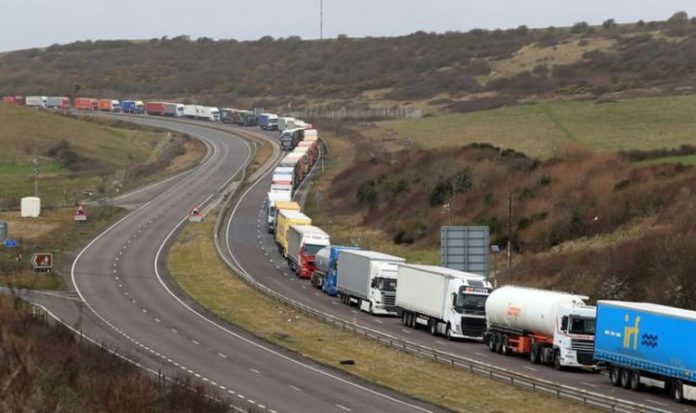Transport bosses are looking at a series of measures as part of Operation Brock to prepare for possible disruption to cross-Channel trade when the Brexit transition period ends on December 31. Under new plans hauliers driving to the Port of Dover or Eurotunnel, Folkestone would be required to be in possession of a Kent Access Permit (KAP) or face a £300 fine.
KAPs would be issued to drivers who have received a green or amber result from the online Smart Freight system, which is being developed by the Government in a bid to ensure goods are ready to cross the border before journeys begin.
Each KAP would be valid for 24 hours to cover a single trip.
Drivers found heading to Dover or Folkestone without one face being hit with a £300 fine by officers from the police or Driver and Vehicle Standards Agency.
Chris Yarsley, policy manager for road infrastructure at trade association Logistics UK, hit out at the plans for permits, saying it would add “more red tape” for truckers.
He warned the permits would create an “internal UK border”.
Mr Yarsley said: “It is disappointing to see that the Government is expecting significant friction at the border with the EU after the logistics industry had been given previous reassurances that friction would be minimised.
READ MORE: Brexit LIVE: Boris Johnson’s trade deal will look like ‘clean no deal’
If it becomes blocked up by customs checks, tailbacks of lorries would quickly form on roads leading to Dover.
Mr Yarsley urged ministers to provide reassurance that Smart Freight “will be available and ready to use on 1 January 2021”.
He added: “The current proposals leave too many questions unanswered and very little time available in which to identify and implement solutions to keep the country trading.”
Transport Secretary Grant Shapps said enabling goods to continue to flow smoothly is an “underlying objective” in the Government’s negotiations with the EU about their future relationship.
He added: “There is at least initially a risk of some additional friction at the border – notably if goods arrive without having completed the necessary customs and other processes.
“It is thus important that we put in place plans both to minimise the risk of disruption and to mitigate its impact should it occur.”







